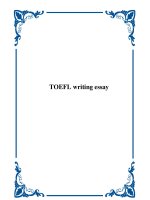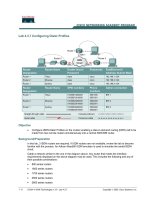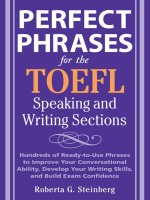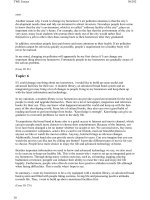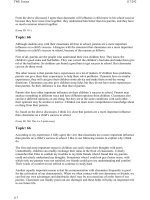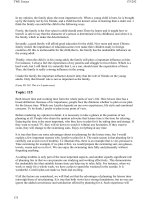TOEFL writing essay
Bạn đang xem bản rút gọn của tài liệu. Xem và tải ngay bản đầy đủ của tài liệu tại đây (128.57 KB, 27 trang )
TOEFL writing essay
PART I
INTRODUCTION
-----------------
I. Purpose
In order to be able to write good essays it is first of all essential to make
sure you understand the purpose of the task. It may seem obvious: the
purpose is to test your ability to write essay for university or college in
English. However, a moment's reflection will make it clear that the test
task is quite unlike a university essay, since it is typical one and a half (1
& 1/2) to two (2) pages long and it written on an unprepared topic in about
half an hour. No university essay is like that. Even in university
examinations, where you may have to write about two pages in half an
hour, you are expected to have studied the topic in advance.
1. Key terms
This is the easiest part of the essay to deal with, usually. Normally the key
words deal with a familiar topic, such as computer or television in the
examples given above. This is be cause the examiners are not testing you
for knowledge, but rather for you ability to write well. Therefore the topics
chosen will be about concepts and issues that they expect every educated
person to know something about. Common topics include.
Education
Population
The Environment
Computers
Lifestyles (including Life in Cities, the
Country, Traffic problems)
Culture and Society
Foreign languages and travel
Television
Health
Development Issues
Try to suggest other topics that you known have been used in previous
examinations, or that you think might occur.
In order to be prepared with ideas on such key concepts, it is necessary to
keep up to date with the major issues being discussed in the world. The
editorial pages of newspapers and news magazines are important sources
of such information, as are current affairs radio and television programs.
2. The aspect of the topic
This is where students often make a mistake because they jump to
conclusions about what it is that they are expected to say about the topic.
Consider the following topics:
A/ Computers have provided great benefits to modern society. Discuss.
B/ Computers are the most important invention of this century. Do you
agree?
C/ Modern society would not be able to operate without computer. Do
you agree?
In each of the above, the topic is computer, and their importance in
modern society. However, each topic raises different question and mush
be answered differently. It is necessary to study the remaining words
carefully to see what is required.
(a) have provided great benefits
(b) are the most important invention
(c) would not be able to operate without
Clearly, (a) is a much weaker statement than (b) or (c). In (a) all that is
required if you agree with the statement, (and it would be hard not to) is to
list and describe some of the benefits of computers. On other hand, for (b)
and (c) it is necessary to argue whether computers are more important
than other inventions. This is a much stronger position to take than the one
required in topic a/.
There is also a difference between (b) and (c), however. In (b) you are
asked to compare computers with other inventions and to demonstrate that
they are, or are not, more important for modern society. That is, you
must consider modern society rather than computers as the basic of your
essay.
Exercise 2.1
Test your ability on interpret topics by identifying which of the following
basically ask the same question, even if the wording is different
a) Tertiary education is of greater benefit to the individual than to the
society. Discuss.
b) How important is the home background in influencing a child's
educational success?
c) Tertiary education should be free because it benefits the whole
society. Do you agree?
d) The home has a greater influence on a child's ultimate success than
the school. Discuss.
e) The attitude of parents is more important than the quality of the
school in determining children's success.
f) Tertiary education is the key to a successful career
g) Discuss the relative influence of the home and the school on a child's
intellectual and social development.
h) Can modern science and technology solve the problem of feeding the
entire population of the world?
i) Feeding the world's growing population is our greatest social problem.
Do you agree?
j) Discuss the argument that the problem of feeding the world's growing
population is only one of distribution, since there are adequate resources
available through science and technology to supply everyone's basic
needs.
(Please see Answer keys at the end of this instruction sheets)
3. "Translating" the topic.
All "discussion" topics can be reduced to basic propositions. That is to
say, all topics which do not require a description or explanation can be
expressed in such a way that it becomes clear that there are only about 6
basic answers possible: yes; no; maybe/ it depends; partly; a lot; a
little.
Look at these topics again:
"Do you consider computers to be indispensable in the modern world?"
"Computers have been the most important development in modern times.
Do you agree?"
The simplified answer to these topics must be either yes or no. Even if the
expressions do you consider or do you agree are left out, the topic must
still be answered with:
Yes, I agree, or: no, I don't agree.
Now look at this topic:
"Computers have improved the quality of our lives".
In this case you may not want to say either: yes, I agree, or: no, I don't
agree, but just: I partly agree.
In this topic:
"Computers are a valuable educational tool"
You may want to answer: it depends (i.e., it depends on how they are
used) instead of simply agreeing or disagreeing.
Finally, in a topic like this:
"To what have computers improved modern lifestyles?"
The simplified answer would be: a lot; a little or: partly.
Exercise 3.1
Look at the following topics and decide which of the above basic
answers you would give:
a) The environment has been said to be the single most important issue
in the world today.
b) The responsibility for protecting the environment rests with the
individual and not only with the government.
c) To what extent should industry be made to pay environmental
pollution?
d) Modernization is leading to the destruction of the earth as a home for
humans and animals.
e) To what extent can individual ensure that the environment is
protected from pollution?
f) Mankind will destroy the planet within the next century. Discuss.
(Please see Answer keys at the end of this instruction sheets)
Whatever essay topics you are dealing with, first decide whether they involve a
"discussion" type of answer, and if so, work out which of the above basic answers is
appropriate. This will make your task of writing the essay much simpler.
4. Defining the Terms
Some books and teachers tell you that you must define the terms you use
so that the reader will understand you. This is sometimes true, but it is
necessary to be sensible about it. For example, look again at the above
example:
a) Computers have provided great benefits to modern society. Discuss.
b) Computers are the most important invention of this century. Do you agree?
c) Modern society would not be able to operate without computers. Do you agree?
In all these questions, the key term computers does not need defining,
since everyone understands this term in the same way. The term modern
society could be a little more problematic, since there are so many
different aspects of society, that not everyone may be thinking of the same
thing when they use this term. However, in a short essay like this it is not
necessary to become a social scientist and to define a term which is
generally understood in the same way by most people.
However, in an essay in which you are asked to argue a point, it is
necessary to evaluate concepts and in that case you must at least have
some sort of definition of your values in your head, even if you do not
define them in words. It is here that a definition is useful and important
tool to help to you write your essay. Let me explain this from the above
examples.
In topic a): the evaluation term is benefits. What do you mean be benefits?
Dose everyone have the same idea about what a benefit is? Probably most
people would agree in most cases for example saving time and saving
money are generally as beneficial by most people. In this case, therefore, it
is not necessary to worry about writing a definition of benefits, but it is
helpful for you, when deciding what to include in your essay, to think
about exactly what you mean by this concept.
In topic b): the restricting words are most important invention. Now, there
is no problem with the word invention, but how do we determine
importance? Does everyone have the same idea of it? Essentially this topic
really requires you to deal with the concept of importance as much as with
the concept of computers. In other words, it is not enough to list some of
the benefits of computers here-it is necessary to demonstrate what one
means by important and then to show how computers fulfil this function.
In other words, one must establish one's criteria for determining
importance in this context. For example, one can say that computers are
good for playing kinds of games, but is this an important function?
In the above examples, the words benefit and important are terms that
clearly indicate the need for evaluation. Sometimes, however, the
evaluation is indirectly indicated, as in example c).
In topic c): the restricting terms are would not be able to operate without.
This raises a more interesting problem of definition. What dose operate
mean in this context? If we are talking about a machine, there is no
problem in discussing how to operate it, and everyone will have the same
idea. But what does it mean to say that a society is operating? Would we
all have same idea? And, even more confusing, how can we say it is NOT
operating? What is actually required here is a discussion that implies that
modern society can or cannot operate well without computers. How well?
Well, that is what needs to be evaluated by the write!
Exercise 4.1
Look at the following topics and underline any terms that are evaluative.
Then decide what exactly needs to be evaluated in each case, if anything.
a) What in your opinion are the main problems facing modern industrial
society?
b) Modern technology has increased our material wealth but has
decreased our personal happiness. Discuss.
c) Television does more harm than good, according to many critics. Do
you agree?
d) It is often claimed that television and films encourage violence. What
is your opinion?
e) Computers have improved the quality of our lives.
f) People in modern cities live under too much stress.
(Please see Answer keys at the end of this instruction sheets)
II- Writing
1. Selecting And Organising Language.
Now that you have selected and organized your content, you can focus on
the actual writing. We will consider the traditional division of an essay
into introduction, body, conclusion and decide what goes into each of
them. But it is also necessary to be aware of what is the appropriate style
of these essays, and how to deal with problems of grammar and
vocabulary.
2. The Introduction
The purpose of the introduction is to let the reader know.
a) the topic
b) the aspect of the topic
c) the stand taken by the writer.
In other words, the introduction actually contains the conclusion!
For example, if the topic is:
(Topic a): Do children watch too much television nowadays?
You should let your reader know in the introduction whether your answer
is yes or no.
The rest of the essay then provides support for your argument.
The structure of the introduction follows a common pattern
To introduce the topic and explain why it is worth talking about, you will
normally need a statement something like this:
( Topic b): Television is so common that nowadays it is hard to
imagine life without it.
That is, the first sentence typically makes a general statement about a
situation.
The next statement then narrows the topic down to the specific aspect the
write will deal with.
For example:
However, as many people have pointed out, most children spend too much
time in front of television, and this is harmful.
The second sentence often contains the word but or however to show that
the writer something new or different to say. For example, if the first
sentence is:
Many people complain nowadays that children spend a great proportion
of their lives watching television.
Then the second sentence would be more likely to present the opposite
view, such as:
This may be true in some cases, but it is certainly not common enough to
be serious problem.
It is, however, not always the case that the second sentence contains a but
or however. It may also support and strengthen the first sentence. Here are
some examples:
(Topic a): Do children watch too much television nowadays?
Television has become so much a part of lives, that many people do not
realize how many hours they actually spend watching it. In fact, it has
been pointed out that most children watch far more television than is good
for them.
( Topic b): The environment has been said to be the single most
important issue in the world today. Discuss.
People are gradually becoming aware of the fact that we are destroying
our natural environment. We should realize that more of the other
problems we face more important than this one.
Language Use
In introductions the tens is normally the present (e.g. complain) or present
perfect (e.g. have pointed out).
It is best to avoid repeating the exact words of the topic. If you paraphrase
you will make a much better impression. Look at the examples above and
see how even the simple words in Topic
a/ watch too much television have been paraphrased in the examples to
become: spend too much time in front of television and: spend a great
proportion of their lives watching television.
Here is another example from Topic
b/ there are many problems facing the world today, including warfare,
population growth and famine. However, none of these problems is as
serious as the destruction of our natural environment.
The above examples, the writer's argument (i.e. the conclusion) is made
clear in the second sentence.
The introduction therefore contains one statement which introduces the
topic and a second statement which presents the author's stand, or attitude
to the topic. Sometimes this statement, also known as the thesis or
proposition, occurs in the third sentence.
Exercise 2.1

